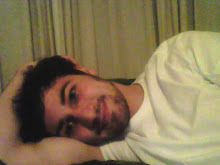War is hell (surprise! surprise!) in Samuel Maoz’s visceral debut Lebanon
Samuel Maoz / Israel / 2009 / 92m
Taking a stylistic cue from Alfred Hitchcock’s Lifeboat, Samuel Maoz’s Lebanon takes place completely inside of a tank, with the exception of the first and last shot. This presents a challenge to both the filmmaker and the viewer. Maoz’s film is not completely successful, although it works on an aural and visual level. Comparisons to Waltz with Bashir are only indicatory of the time and war, while comparisons to The Hurt Locker are unfounded on another plateau – director Kathryn Bigelow understands the rhythm of war and knows how to express it, while the spatial restriction controls how much Maoz is able to convey, and the confidence he must have in his actors. Unfortunately, Lebanon’s impact is weakened by the cast’s theatrical acting and Maoz’s uncertainty about the message he wants to convey.
Within the confines of the dank, limited space, Maoz introduces four soldiers – the shooter, the driver, the shell loader and the leader of the troupe. A commanding officer appears here and there to relay the group’s mission, but the film concentrates on these four young men who are clearly not ready to be fighting any kind of war. Shmulik, the man in charge of firing, is loosely based off Maoz’s own experiences in the 1982 Lebanon War. In the beginning, when the enemy is coming straight at the tank, he is unable to gun them down. This ends in the death of an Israeli soldier from the outsider of the tank, who is then thrown in and acts as a constant reminder of his hesitancy. The viewer never gets to know the soldiers well enough to care about them, and this is a major problem as Maoz has no other choice with the gimmick he chose to employ but to script the action solely around them. The dialogue exists as purely functional to pass the time and advance the story.
The film opens with a beautiful, straightforward eye level shot of a field of limp sunflowers. Maoz returns to this image at the end, but with a tank driving through it. So painful and hackneyed is one of the obvious messages he is trying to express – war is hell and beauty is destroyed by the carnality of human behavior and politics – that it is hard to understand why the film won the Golden Lion at the Venice Film Festival. Also, by the end it’s hard to remember the aspects of the film that were actually successful, like Alex Claude’s perfect sound design and the minimalist score by Nicolas Becker. Giora Bejach’s photography is particularly striking with the way light plays on the actors’ faces. Maoz also successfully explores the soldiers’ feelings and their tenuous relationships. In one of the most powerful and affecting scenes, one of the soldiers shows compassion towards a Syrian war prisoner. In the end, Lebanon never does rise above its gimmicky premise and experimental style.


No comments:
Post a Comment